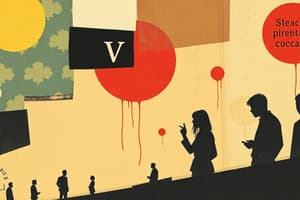Podcast
Questions and Answers
Which concept, introduced by C. Wright Mills, allows individuals to connect their personal lives to broader societal patterns?
Which concept, introduced by C. Wright Mills, allows individuals to connect their personal lives to broader societal patterns?
- Sociological imagination (correct)
- Symbolic interactionism
- Cultural relativism
- Social stratification
How did Karl Marx view the structure of society?
How did Karl Marx view the structure of society?
- As shaped by class conflict, divided into two main classes. (correct)
- As a unified entity striving for consensus.
- As organized around shared cultural values and norms.
- As a collection of independent individuals.
What is the focus of micro sociology?
What is the focus of micro sociology?
- Examining face-to-face interactions and gathering data through participant observation. (correct)
- Studying the impact of global economic systems on local communities.
- Investigating the historical development of social institutions.
- Analyzing large-scale social trends using statistical data.
Which of the following best describes 'Verstehen,' as introduced by Max Weber?
Which of the following best describes 'Verstehen,' as introduced by Max Weber?
What is the primary focus of functionalism as a sociological theory?
What is the primary focus of functionalism as a sociological theory?
Which research method involves learning through face-to-face interviews and cannot be easily converted into numerical data?
Which research method involves learning through face-to-face interviews and cannot be easily converted into numerical data?
How does 'culture shock' manifest itself?
How does 'culture shock' manifest itself?
What is the focus of 'nurture' in the nature versus nurture debate regarding socialization?
What is the focus of 'nurture' in the nature versus nurture debate regarding socialization?
How does cultural lag occur?
How does cultural lag occur?
What does 'Ethnocentrism' refer to?
What does 'Ethnocentrism' refer to?
Flashcards
Sociology
Sociology
The systematic study of human society and relationships.
Sociological Imagination
Sociological Imagination
The ability to connect personal experiences to broader social and historical contexts.
Social Institution
Social Institution
A group of social positions performing a social role, like the legal system or labor market.
Micro Sociology
Micro Sociology
Signup and view all the flashcards
Macro Sociology
Macro Sociology
Signup and view all the flashcards
Double Consciousness
Double Consciousness
Signup and view all the flashcards
Verstehen
Verstehen
Signup and view all the flashcards
Division of Labor
Division of Labor
Signup and view all the flashcards
Functionalism
Functionalism
Signup and view all the flashcards
Hypothesis
Hypothesis
Signup and view all the flashcards
Study Notes
- Sociology: The systematic study of human and societal relationships.
- "Making the familiar strange" challenges conventional wisdom.
- Sociological imagination (C. Wright Mills): Connects personal experiences to society and historical forces.
- Social institutions: Social positions connected by social relations doing a social role that greatly shape actions and are constantly shifting.
Micro Sociology
- Focuses on local interactions, face-to-face encounters, gathering data from participant observation, and in-depth interviews.
Macro Sociology
- Analyzes social dynamics across whole societies using statistical analysis.
- Sociology became a discipline in the 19th century due to various revolutions.
- Auguste Comte: Coined "sociology" viewing society as scientifically analyzable.
- W.E.B. Du Bois introduced double consciousness.
- Double consciousness describes the internal conflict experienced by African Americans navigating their identity in society.
- Marx emphasized class conflict and societal division into two classes.
- Weber introduced Verstehen, meaning "understanding," suggesting sociologists understand subjective meanings.
- Durkheim introduced functionalism.
- Class conflict shapes society through two main classes.
- The division of labor in industrial societies maintains cohesion through task interdependence.
- A theory can give a belief of ideas that could be researched.
- Functionalism views society as a system with interrelated parts maintaining balance.
- Conflict Theory highlights conflict as a driver of social change.
- Feminist Theory emphasizes women's experiences and addresses subordination of women.
- Symbolic Interactionism: Micro-level theory focused on shared meanings and assumptions behind actions.
Scientific Method
- It is a involves formulation, testing, and modification of hypotheses.
- Inductive approach involves observation and research.
- Deductive approach bases research on a theory.
- Qualitative methods consist of learning through face-to-face interviews, that cannot be converted into numbers
- Quantitative methods consist of research obtaining data for numbers.
- A theory is a system of ideas explaining something.
- Correlation tracks variables' positive or negative relationships.
- Dependent variable: The the goal the researcher is trying to explain
- Independent variable: A measured factor believed to influence the dependent variable.
- Hypothesis: A proposed relationship between variables that leads to a direction.
- Operationalization: A precise definition for measuring a concept in a study.
- Reflexivity: Critically analyzing one's role in research.
- Participant observation: A qualitiative method to analyze behavior
- Interviews: A process focused on the why and how of people's actions.
- Survey research: A quantitative method to analyze answers
- Informed consent: Assurance and knowledge of study participation.
Culture
- A set of beliefs, traditions and practices
- Media/mass media: A system where one can socialize in it
- Values- Internal beliefs one can have
- Norms- What “normal” things should be where we follow it when in society.
- Cultural scripts shape life.
- Subculture: A culture within a broader culture
- Code-switching: Ability to change languages and norms in different environments.
- Culture shock: Stress from being in a new environment.
- Ethnocentrism: Belief in one's culture's superiority.
- Cultural relativism: Having no bias on any culture
Material vs nonmaterial culture
- Material- Physical objects that people can define as part of their culture
- Non-material- the values and beliefs that are associated to the material culture
- Cultural lag: Where material culture moves quickly than non material
- Political economy of media: Where companies pitches new ideas to get to the consumer
- Socialization: Learning and internalizing society's norms and beliefs.
- Nature vs. Nurture: Role of heredity versus learning.
- Nature focuses on hereditary in humans
- Nurture focuses on learning socialization and culture
- Self: An individual's identity.
- George Herbert Mead created the concept of the generalized other
- The generalized other: How social self develops over childhood
- Socialization agents: Certain areas such as school help one grow socially
- The work of Annette Lareau- Parenting strategies are impacted by social class
- Resocialization: Intense training in social norms and values.
- Adult socialization: Socialization in adults taking on new roles/jobs.
- Status: A position within a social group.
- Role: Expected behavior in a particular society.
- Status set: All the statuses we have
- Ascribed status: Status given at birth or by society.
- Achieved status: Status earned through choices and completion.
- Master status: The most consideration in interactions
- Cooley developed looking-glass self.
- Goffman views life as a theatrical performance.
Deviance
- Is any transgression of a socially established norm
- Social control creates normative compliance.
- Crime leads to life changes.
- Social cohesion forms social bonds.
- Formal and Informal deviance
- Formal and informal sanctions
- Formal Sanctions are punishments/rewards by social groups.
- Informal sanctions are unspoken expectations.
- Structural strain theory explains deviance when society restricts equal opportunity.
- Innovator: Someone who creates ideas that can be spread
- Relativity of deviance depends on social standards and norms.
- Labeling Theory explains people adopt specific labels.
- Primary Deviance is the first rule breaking act.
- Secondary deviance describes acts of rule breaking after the action of primary deviance
- Rational Choice theory explains by rational decision making
- Deterrence theory is based on the criminal justice system.
- Recidivism is reverting to crime after release.
Studying That Suits You
Use AI to generate personalized quizzes and flashcards to suit your learning preferences.




